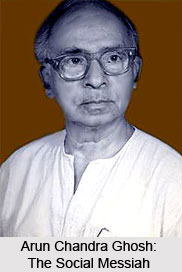Arun Chandra Ghosh is the identity that Shilpashram and Purulia District banks upon. He is the eldest son of Atul Chandra Ghosh and Labanya Prabha Ghosh the two stalwarts of Indian Freedom Movement and the aftermath of the struggle when India had been on its grand way to the making of Contemporary India, a India that was bogged down by the impending fears of half made societies and a lack of culture of their own. What Arun Chandra Ghosh had contemplated was but a homogeneous bond of identity, strikingly different from the Eurocentric colonisers` thrust upon identity pushing aside the half made societies.
 With his father and mother as Atul Chandra Ghosh and Labanya Prabha Ghosh it was but obvious that he was brought up in an environment of freedom fighters at Shilpashram, Purulia. British government jailed him several times during the period 1930-47 for different agitations like "Pataka-Satyagraha" (Konapara), Indian Republic Day and Celebration (1932) etc. He was a student in Shantiniketan under the tutelage of Great Master of Fine arts, Nandalal Bose however as it had been in his blood he followed the footsteps of his father and left study to join Salt Movement.
With his father and mother as Atul Chandra Ghosh and Labanya Prabha Ghosh it was but obvious that he was brought up in an environment of freedom fighters at Shilpashram, Purulia. British government jailed him several times during the period 1930-47 for different agitations like "Pataka-Satyagraha" (Konapara), Indian Republic Day and Celebration (1932) etc. He was a student in Shantiniketan under the tutelage of Great Master of Fine arts, Nandalal Bose however as it had been in his blood he followed the footsteps of his father and left study to join Salt Movement.
After independence, he again came to forefront in "Language Agitation` (Bhasa Andolan) and it was under his leadership, "Lok Sevok Sangho" fought against the strained imposition of Hindi language at Bengali dominated areas of the then Manbhum district. "Lok Sevok Sangho" spread out Tusu-Satyagraha Agitation, Bango Satyagroha Abhijan (March from Pakbirra to Kolkata on 20th April 1956 in remonstrate against the unification proposal of Bengal with Bihar).
However later, due to constant pressure from the Bengali students and youth, the Bihar state government was likewise compelled to back down. Ultimately, Purulia was acceded to West Bengal from Bihar on 1st November 1956. Given the extent of mass participation in anti-authoritarian social agitation, Manbhum district (now Purulia) proudly stands with countries like Bangladesh, Philippines, Haiti, and many others. He was also the editor of "Mukti" the first Bengali bi-weekly from Manbhum district till his death. It played a great role during the independence movement and "Language Agitation.`




















